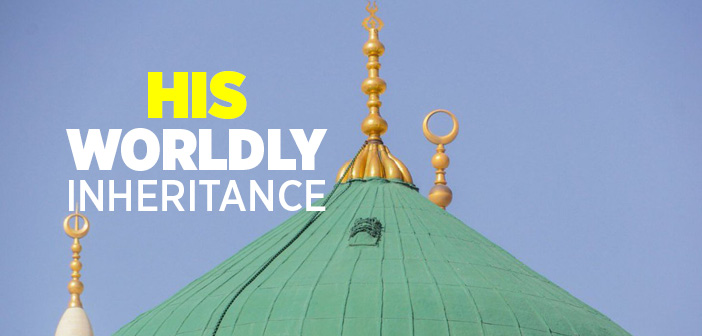What is prophet muhammads worldly inheritance?
The Prophet (pbuh), who regarded this world as a place of making preparations for the Hereafter and who lived his life knowing that only righteous deeds would give eternal benefits, said that:
“We (Prophets) do not bequeath anything to our heirs, but whatever we leave is to be given in charity.” (Bukhari, Nafaqat, 3) Therefore, it is obvious that his inheritance could only be a few absolute necessities.
According to the narration of Juwayriyah (r.a.), when Allah’s Apostle died, he did not leave any dirham or dinar (i.e. money), a slave or a slave woman or anything else except his white mule, his arms and a piece of land which he had given in charity.” (Bukhari, Wasaya, 1)
As a matter of fact, based on the above mentioned saying of the Prophet (pbuh), all the real estate left by the Prophet (pbuh) were regarded as endowments. In addition, as real estate he left the above mentioned lands and the rooms built for his wives. However, another prophetic saying states that “…My heirs will not inherit a dinar or a dirham (i.e. money), for whatever I leave excluding the adequate support of my wives and the wages of my employees is given in charity (or is an endowment)”; thus, he points out the need for providing the livelihood and residence for his wives after his death.[1]
In fact, Allah’s Messenger had endowed everything he owned for the benefit of the public during his life provided that he was going to use them until his death. In other words, from these lands he was separating the sustenance of his family and spending the rest for the needs of the Muslim state and community. (Nawawi, Sharhu Sahih Muslim, XII, 82) Thus, after his death his blessed wives were not left alone; their sustenance was provided for through these lands and they continued to live in their rooms till they passed away. (Mawardi, 217-21)
Endowments of the Messenger of Allah and his following saying opened a new era for humanity. “Abu Huraira (r.a.) reported Allah’s Messenger (pbuh) as saying: When a man dies, his acts come to an end, but three: a recurring charity, or knowledge (by which people) benefit, or a pious son, who prays for him (for the deceased).” (Muslim, Wasiyyah, 14) From the first days of Islam up until today many Muslims have been doing their best to follow the Prophet’s advice. They have established several endowments and supported various charitable institutions. Thus, they have established ways to earn continuous spiritual rewards and presented humanity with a unique civilization of endowments.
In conclusion, our Prophet (pbuh) preferred to live a simple, modest, and an honorable life by being patient when he was in need and helping and giving to others when he had the means. Because he advised his followers to live a life based on ascetic principles not a life based on competition of earning more wealth. He explained to them how excessive ambition and worldly desires might lead to all kinds of mischief; and he showed them the best way to live an Islamic life. The order in his home, his garments, his food, his drinks, along with his guiding words and advices, or his worldly inheritance are the best witnesses of this reality.
How happy those who benefit from the guidance of the Prophet’s ascetic life are!
[1] Bukhari, Wasaya, 32; Muslim, Jihad, 55. The word “employee” means the workers who were taking care of Prophet’s lands and date grove. In fact such a worker, who was taking care of the Prophet’s date grove, was mentioned in some other reports. (Muslim, Musaqat, 99-100)
Source: An Excellent Exemplar, Osman Nuri Topbaş, Erkam Publications





